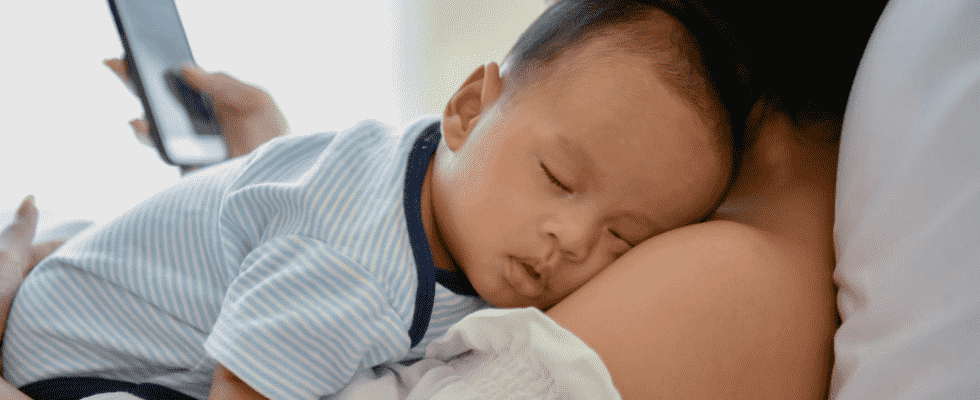Because some families affected by disabilities may feel deprived and isolated, the association Tombée du nid has developed the first free mutual aid application, called Le Coeur du Nid. A tool that offers concrete help to parents of children with disabilities, thanks to the contact of volunteers trained by professionals. Details.
Families with a child with disability or wishing to adopt one are often confronted with many obstacles. On a daily basis, for example, some parents may feel completely deprived by the slowness of the administrative procedures and the famous MDPH file to be completed. Still others, who have just learned that their future baby has a malformation or a mental or physical handicap, may ask themselves a thousand questions about the pathology of their little one, about what daily life will be like with him, and have no concrete answers. Moreover, it is a struggle for everyone to find the specialists and health professionals suitable for the pathologies of their children. So many situations that force these families to be isolated. This is precisely one of the two observations made by Clotilde and Nicolas Noël with their Fallen from the Nest Association few years ago. To remedy this, but also the long steps to adopt a child with a disability who is a pupil of the State, an idea came to them: to create a mutual aid application at the service of families. From there is born in June 2022 the application Le Coeur du Nid (available on iOS and android), a 100% free and caring app.
What is the purpose of the Heart of the Nest application?
The primary goal of the Heart of the Nest application is to put families in need of help in touch with volunteers ready to help them for free, on their free time, and who are close to them. The idea also behind Le Cœur du Nid is to create social mutual aid and bring a little comfort and listening to parents who need it. For the volunteers, it is also a means of sharing their life experiences, especially if they themselves are affected by a disability.
“This application can be downloaded throughout France. However, only volunteers who are in Ile-de-France can now apply on the application”, explains Delphine Piffard, operational director within the association. For the moment, the application is deployed only in Ile-de-France for an experimental phase (with 100 volunteers and 200 families), but the medium-term objective is to be present everywhere, in several French regions with local teams. Anyway, a toolbox is available on the application for each user everywhere in France. It includes several sections, including a glossary, a toy library, names and information on childcare facilities (IME, nurseries, schools, etc.) or even practical everyday tips.
Who are the volunteers?
In principle, anyone can be a volunteer, as long as there is a real motivation behind the commitment. “We don’t want free electrons, we want real strength in commitment”explains Clotilde Noël. Today, on the application in Ile-de-France, volunteers are listed under the sweet name “Dad and Mom bird”. They apply via a form on the application, they are then recruited and interviewed then trained by professionals. Once the training is finished, with the association they determine concretely what help they will be able to provide to the different families: listening, tips, advice on administrative procedures, etc… Throughout their commitment, they are followed. Some volunteers may be directly affected by the disability, or simply be affected by the cause.
The Heart of the Nest application is very easy to use. Families create an online account, they fill in some information. They are then identified as “Chick” in need of help. They formulate what they seek as help. There are 6 categories in total: listening, daily help, pregnancy, adoption, sharing and tips, and administration. A volunteer then receives the request on his account via the application and it is up to the Tombée du Nid association to connect the family and the volunteer. The association looks at whether the request for help corresponds to the field of action of the volunteer, whether the proximity is respected and that is when the match operates or not.
What is the feedback from families and volunteers?
So far the feedback from families and volunteers has been very positive. Myriam, who is a volunteer on the application and herself a mother of a 2-year-old boy with Down syndrome, testifies to this: “I discovered my child’s disability during pregnancy, I felt isolated by the lack of information, I wanted to know what was going to happen to my child but I had no answers. I discovered the association after giving birth and I was reassured by their listening and their advice.I got involved as a volunteer, because I wanted mothers, who may be in the same situation in which I I was, did not find themselves isolated. Since September 2022, I have been accompanying a mother-to-be who also learned in utero of her child’s diagnosis of trisomy 21. She too wanted to hear the reality of how it goes on a daily basis with a child with Down syndrome, both the joys and the difficulties. And she said thank you for sharing my own experience and for having listened attentively, which she also needed.” Listening and simple presence are often essential in this type of support.
Nicolas, another Poussin dad, also directly affected by disability through his daughter, has found that Le Coeur du Nid is a real community you can count on. “We are not unhappy, life goes on, the projects are still there, we have all the more, because this community with the association and the application gives more friends. The help of friends is more essential. The Heart of the Nest is a platform that we needed!”
